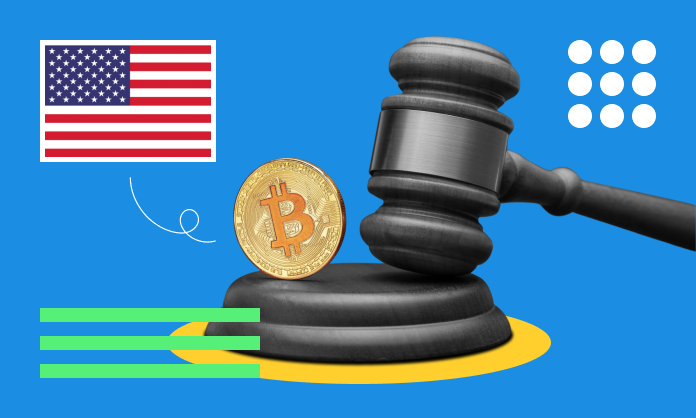There’s no need to say how cryptocurrencies have changed the economic landscape. It has completely transformed transactions through direct peer-to-peer transactions on decentralized networks. Let’s clarify about Cryptocurrency Regulation in the US.
The meaning? The boundary between regulatory power overpayment and freedom of using the currency is thinning out. With cryptocurrency, intermediaries like the bank or the government cannot interfere between two entity’s financial transactions.
It has created a considerable interest in payment among people worldwide. Yet, it has highlighted crucial worries regarding consumer safety, fraud prevention, and market stability. With the cryptocurrency market expanding, the need for efficient regulation is becoming more essential.
In this article we have explored the Cryptocurrency Regulation in the US and examine the details of the same.
About the Cryptocurrency Regulation in the US
The regulatory environment of the cryptocurrency market is intricate. There are several regulatory frameworks like SEC, CFTC, and FinCEN. The regulations include an intricate historical context, varying from state to state.
Cryptocurrency Regulations in the US: Historical Context
Cryptocurrencies became popular since Bitcoin came into existence in 2009 and started to influence the regulatory landscape.
- 2014 Mountain. Gox Hack: the first significant change happened with the downfall of this significant Bitcoin exchange. It revealed weaknesses in cryptocurrency security and sparked demands for regulatory supervision.
- SEC Measures Regarding ICOs: The Securities and Exchange Commission (SEC) initiated investigations into Initial Coin Offerings (ICOs) in 2017, resulting in actions against deceptive ventures.
- Legal Cases: Different court decisions have clarified the categorization of cryptocurrencies as either securities or commodities, impacting their regulatory framework.
All these changes gradually started to highlight the increased necessity for a systematic regulatory framework. The intention was to safeguard consumers and maintain market integrity.
Current Regulatory Framework in the U.S.
There are several federal agencies in the US with oversight of cryptocurrencies and their various activities. Each of the agencies has its own unique functions to manage the cryptocurrency landscape in the country. These organizations are SEC, CFTC, and FinCEN.
This intricate regulatory environment keeps changing as cryptocurrencies become more significant in financial markets. You’ll find more details about these regulatory bodies below –
Securities and Exchange Commission (SEC)
The SEC plays a crucial role in overseeing cryptocurrencies deemed as securities. Its main duties consist of:
Securities Classification: The SEC has concluded that numerous cryptocurrencies can be classified as securities, thereby making them subject to strict regulations under the Securities Act of 1933 and the Securities Exchange Act of 1934. This categorization requires that any cryptocurrency deemed a security must be registered with the SEC, guaranteeing adherence to disclosure and reporting obligations.
Enforcement Measures: The SEC diligently enforces regulations by taking legal action against individuals and firms that do not adhere to securities laws. Significant instances involve legal actions taken against popular platforms and networks like Ripple Labs, Coinbase, and Binance for supposedly running unregistered securities exchanges.
Market Integrity: The SEC’s role is to safeguard investors and uphold market integrity by making sure that all market players follow the set regulations. This encompasses the supervision of Initial Coin Offerings (ICOs) and continuous compliance for publicly traded cryptocurrency companies.
Commodity Futures Trading Commission (CFTC)
The CFTC oversees cryptocurrency derivatives and has categorized prominent cryptocurrencies such as Bitcoin and Ethereum as commodities. Essential elements of CFTC regulation encompass:
Commodity Classification: The CFTC has authority over derivatives trading associated with cryptocurrencies, enabling it to oversee futures contracts and options regarding these digital commodities. This categorization as commodities indicates that trading platforms handling these assets are required to adhere to CFTC regulations.
Regulatory Framework: Recent legislative initiatives, like the Financial Innovation and Technology for the 21st Century Act (FIT21), seek to further define the responsibilities of the SEC and CFTC. Under FIT21, assets identified as commodities would be regulated by the CFTC, whereas those classified as securities would stay under SEC oversight.
Financial Crimes Enforcement Network (FinCEN)
Another key player in the cryptocurrency industry is FinCEN. It plays a significant role in anti-money laundering (AML) regulations.
AML Compliance: Every Cryptocurrency exchange must implement AML protocols, which must include customer verification processes known as KYC (Know Your Customer). This ensures that exchanges verify the identities of their users to prevent illegal actions such as money laundering and fraud.
Reporting Responsibilities: FinCEN mandates that cryptocurrency exchanges record any suspicious activities and maintain transaction logs. This way, they will maintain and comply with the same regulations that popular financial institutions like banks maintain. This compliance comes under the Bank Secrecy Act.
Existing Laws Impacting Cryptocurrency Regulation
Different current regulations influence the process of governance for cryptocurrencies in the USA.
The two most important of those laws are –
Securities Regulations: The SEC’s enforcement of securities regulations on cryptocurrencies suggests that digital currencies adhere to the disclosure mandates and safeguard the data of the investors. It should protect the investors from any potential threats.
AML Regulations: the enforcement of AML regulations by FinCen makes the cryptocurrency firms implement tactics that mitigate risks related to financial crimes. This way, it promotes a secure atmosphere for the process of dealing with digital currency.
State-Level Regulations
The regulations and strategies of compliance vary from state to state in the USA. Here are some examples of some common states in the USA and how they deal with cryptocurrency –
New York: The BitLicense system forces cryptocurrency companies to secure a license to function in the state. They took this step to prioritize consumer safety and to ensure regulatory compliance.
Wyoming: Wyoming has established cryptocurrency-friendly laws. It provides an advantageous regulatory environment, thereby attracting popular blockchain companies.
These differences result in a fragmented regulatory landscape that can make it challenging for businesses to comply while operating across state lines.
Challenges in Regulation
It’s not easy for the regulatory bodies to efficiently monitor and oversee cryptocurrencies across states. They face several challenges when trying to enforce these regulations on exchange platforms and cryptocurrency companies. Some reasons behind those challenges are as follows –
Rapid Technological Progress
There are several aspects related to technological progress which you need to integrate effectively. Cryptocurrencies are innovating and changing faster than regulatory compliances.
Jurisdictional Challenges
Identifying which agency has the authority over particular elements of cryptocurrency is complex. This is because of overlapping jurisdictions.
Unclear Guidelines
Vague elements in current regulations may cause uncertainty for businesses and investors regarding compliance obligations.
Although regulation is essential for safeguarding consumers, excessively strict measures could hinder innovation and restrict market expansion.
Future of Cryptocurrency Regulation in the US
In the future, potential alterations in cryptocurrency regulation might emerge from ongoing talks between lawmakers and regulators. The main areas of emphasis consist of the following:
Dynamics of Federal and State Regulation: a trend can start for better consistency in the federal regulations to help companies stay easily compliant with the regulations across the states.
Global Influences: it’s also possible that the global regulatory changes regarding cryptocurrencies can affect US policies. It can start when different nations start to face several regulatory issues.
New Legislation: The rise of technologies like stablecoins could lead to fresh legislative initiatives focused on their distinct features.
Forecasts indicate that striking a balance between promoting innovation and safeguarding consumer interests will be essential as regulations develop.
Conclusion
It’s clear that the relationship between cryptocurrency regulations and the innovative nature of cryptocurrency is complicated. While one tries to ensure public safety and compliance, cryptocurrencies take it to the next level with innovation. From its historical origins to present structures and upcoming possibilities, comprehending this landscape is essential for stakeholders throughout the industry.
As we progress, establishing balanced regulation will be crucial—one that fosters innovation while protecting consumers from possible risks tied to this evolving market. However, most of these challenges can be reduced if the consumers step in to build a growth-friendly environment with cryptocurrency while also adhering to the laws.
For More Business Related Articles Click Below!!!




Leave A Comment